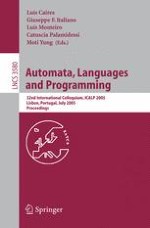2005 | OriginalPaper | Buchkapitel
Approximation Algorithms for the Max-coloring Problem
verfasst von : Sriram V. Pemmaraju, Rajiv Raman
Erschienen in: Automata, Languages and Programming
Verlag: Springer Berlin Heidelberg
Aktivieren Sie unsere intelligente Suche, um passende Fachinhalte oder Patente zu finden.
Wählen Sie Textabschnitte aus um mit Künstlicher Intelligenz passenden Patente zu finden. powered by
Markieren Sie Textabschnitte, um KI-gestützt weitere passende Inhalte zu finden. powered by
Given a graph
G
= (
V
,
E
) and positive integral vertex weights
w
:
V
→
N
, the
max-coloring problem
seeks to find a proper vertex coloring of
G
whose color classes
C
1
,
C
2
, ...,
C
k
, minimize
${\sum_{i=1}^{k}}{\it max}_{v\epsilon C{_{i}} {\it w}(v)}$
. The problem arises in scheduling conflicting jobs in batches and in minimizing buffer size in dedicated memory managers.
In this paper we present three approximation algorithms and one inapproximability result for the max-coloring problem. We show that if for a class of graphs
${\mathcal G}$
, the classical problem of finding a proper vertex coloring with fewest colors has a
c
-approximation, then for that class
${\mathcal G}$
of graphs, max-coloring has a 4
c
-approximation algorithm. As a consequence, we obtain a 4-approximation algorithm to solve max-coloring on perfect graphs, and well-known subclasses such as chordal graphs, and permutation graphs. We also obtain constant-factor algorithms for max-coloring on classes of graphs such as circle graphs, circular arc graphs, and unit disk graphs, which are not perfect, but do have a constant-factor approximation for the usual coloring problem. As far as we know, these are the first constant-factor algorithms for all of these classes of graphs. For bipartite graphs we present an approximation algorithm and a matching inapproximability result. Our approximation algorithm returns a coloring whose weight is within
$\frac{8}{7}$
times the optimal. We then show that for any
ε
> 0, it is impossible to approximate max-coloring on bipartite graphs to within a factor of
$(\frac{8}{7} - \epsilon)$
unless
P
=
NP
. Thus our approximation algorithm yields an optimum approximation factor. Finally, we also present an exact sub-exponential algorithm and a PTAS for max-coloring on trees.
